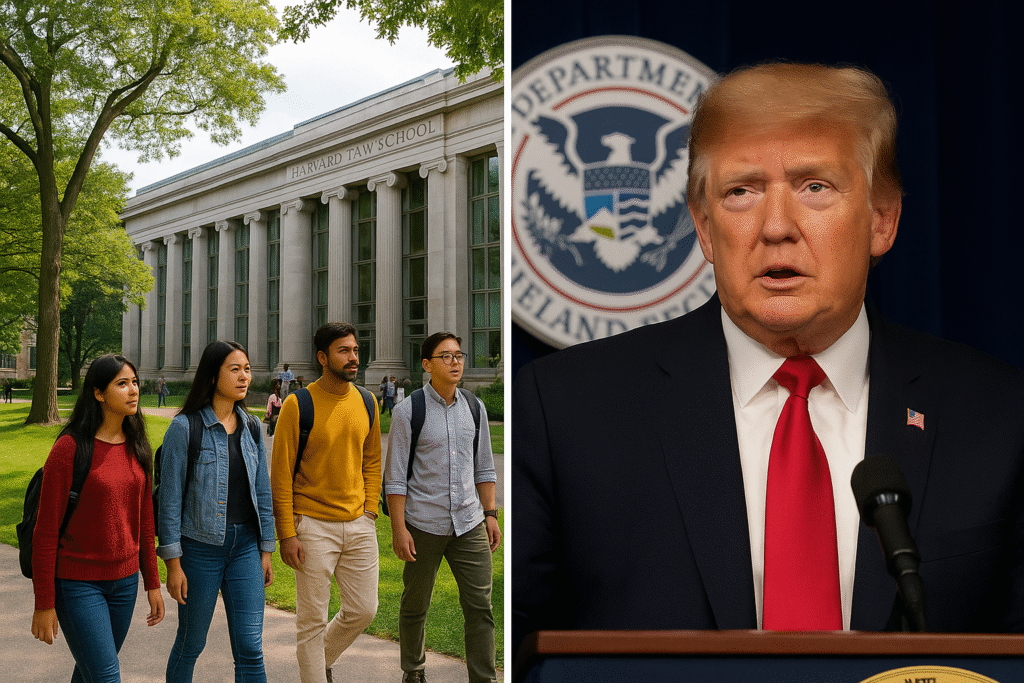Cambridge, MA —
In what is being dubbed “Harvard vs. Trump: Round Two,” tensions have escalated once again between Harvard University and former U.S. President Donald Trump, this time over a proposed 2025 Department of Homeland Security (DHS) policy change that threatens the status of thousands of international students in the United States.
In a move reminiscent of the 2020 controversy, Judge Allison D. Burroughs, a federal judge in Massachusetts, is once again at the center of the legal storm, as Harvard and MIT jointly filed a federal lawsuit against the Trump-aligned DHS earlier this week.
📚 Background: What’s Happening Now?
The controversy centers around a proposed rule backed by Trump’s political coalition, which seeks to limit international student visas to one-year renewable terms, rather than the current “duration of status” model that aligns with academic programs.
Critics say this will make it harder for students from Asia, Africa, and the Middle East to plan their education, while supporters claim it’s necessary for national security and immigration oversight.
Harvard President Claudine Gay issued a strongly worded statement on Monday:
“These changes are discriminatory, unnecessary, and destructive to academic freedom and our global reputation.”
This marks Harvard’s second direct legal clash with Trump-era immigration tactics. The first, in 2020, ended in a high-profile victory when Judge Allison Burroughs ruled against a similar DHS directive that sought to expel foreign students enrolled in online-only classes during the COVID-19 pandemic.
🧑⚖️ Who Is Judge Allison D. Burroughs?
Allison Burroughs, a federal judge for the U.S. District Court for the District of Massachusetts, has gained national attention for her role in high-profile education and immigration cases. Appointed by President Barack Obama, she has presided over multiple lawsuits involving Harvard, including the affirmative action case brought by Students for Fair Admissions.
In this case, Judge Burroughs is once again tasked with determining whether DHS’s proposed policy violates:
- The Administrative Procedure Act
- The Equal Protection Clause
- Statutory protections for educational visas (F-1 and J-1)
Legal experts believe her 2020 ruling will weigh heavily on the court’s decision.
🎓 Harvard’s Global Standing and International Student Impact
Harvard University, consistently ranked among the top three universities globally, enrolls over 7,000 international students each year from over 120 countries. These students contribute not only to the academic diversity of the institution but also to billions in economic value across the U.S. higher education system.
According to data from the Institute of International Education:
- International students added $41 billion to the U.S. economy in 2023.
- Nearly 30% of Harvard’s graduate-level students are from abroad.
- Fields like STEM, law, and public policy are particularly reliant on foreign talent.
Harvard argues that changing visa rules midstream could deter top global students, damage the country’s innovation ecosystem, and hand an advantage to competitor nations like Canada, the UK, and Germany.
⚖️ Trump’s Position in 2025
Though not currently holding public office, Donald Trump remains a dominant political force in U.S. politics. His PAC (Political Action Committee), America First 2025, has been pushing a number of “return-to-order” policy proposals, including tougher immigration control, reinstating Title 42 provisions, and re-evaluating foreign academic influence.
A spokesperson from Trump’s policy board stated:
“We will not allow China, Iran, or any other country to exploit our academic systems for espionage or economic advantage.”
The new DHS rule, they argue, is about vetting, verification, and protecting American students.
🧠 Laurence Tribe Speaks Out
Adding intellectual firepower to Harvard’s case is Laurence Tribe, renowned constitutional law professor and outspoken Trump critic.
In an op-ed for The New York Times, Tribe writes:
“This rule is not just short-sighted, it’s unconstitutional. It seeks to weaponize bureaucracy to bully our most promising minds into leaving.”
He also appeared on CNN to warn about the “silent destruction of America’s soft power” by undermining its education system.
📰 Media and Public Reaction
Major news outlets like AP News, The New York Times, and The Guardian have placed the story on their front pages under categories like Education, Immigration, and Politics.
The AP headline read:
“Harvard Challenges Trump-Backed Visa Changes in Court—Again”
Meanwhile, social media platforms like X (formerly Twitter) have exploded with hashtags:
- #HarvardVsTrump
- #JudgeBurroughs
- #InternationalStudents
- #Trump2025
- #HarvardSuesDHS
TikTok creators and Instagram influencers in the study-abroad niche are rallying support under the #LetThemLearn movement.
📉 What’s at Stake?
Harvard’s lawsuit may be the first of many, as Yale, Stanford, Columbia, and MIT are reportedly considering joining the complaint or filing parallel suits.
If the policy goes into effect, students could be forced to:
- Renew their visa every year (costly and bureaucratic)
- Risk denial even mid-degree
- Face delays in OPT (Optional Practical Training) approval
The global perception of U.S. education as a welcoming, merit-based system would take a serious hit.
📌 Timeline and What’s Next
- March 2025: Policy announced by DHS
- April 2025: Lawsuit filed by Harvard and MIT
- May 2025: Preliminary hearing before Judge Burroughs
- July 2025: Expected final ruling
- Fall 2025: Policy could take effect if upheld
Until then, legal experts say international students should maintain documentation, consult immigration attorneys, and monitor updates from school legal departments
